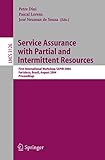Service Assurance with Partial and Intermittent Resources [electronic resource] : First International Workshop, SAPIR 2004, Fortaleza, Brazil, August 1-6, 2004, Proceedings /
Material type: TextSeries: Lecture Notes in Computer Science ; 3126Publisher: Berlin, Heidelberg : Springer Berlin Heidelberg : Imprint: Springer, 2004Edition: 1st ed. 2004Description: XII, 316 p. online resourceContent type:
TextSeries: Lecture Notes in Computer Science ; 3126Publisher: Berlin, Heidelberg : Springer Berlin Heidelberg : Imprint: Springer, 2004Edition: 1st ed. 2004Description: XII, 316 p. online resourceContent type: - text
- computer
- online resource
- 9783540277675
- Data structures (Computer science)
- Information theory
- Computer networks
- Software engineering
- Application software
- Computers and civilization
- Telecommunication
- Data Structures and Information Theory
- Computer Communication Networks
- Software Engineering
- Computer and Information Systems Applications
- Computers and Society
- Communications Engineering, Networks
- 005.73 23
- 003.54 23
- QA76.9.D35
- Q350-390
Bandwidth Allocation -- Fair Bandwidth Allocation for the Integration of Adaptive and Non-adaptive Applications -- A Managed Bandwidth Reservation Protocol for Ad Hoc Networks -- Predictive Dynamic Bandwidth Allocation Based on Multifractal Traffic Characteristic -- Bandwidth Allocation Management Based on Neural Networks Prediction for VoD System Providers -- Policy-Based Operations -- Policy-Based Management of Grids and Networks Through an Hierarchical Architecture -- Policy-Based Service Provisioning for Mobile Users -- Dynamic IP-Grouping Scheme with Reduced Wireless Signaling Cost in the Mobile Internet -- 3G Wireless Networks Provisioning and Monitoring Via Policy Based Management -- Service Monitoring -- Combined Performance Analysis of Signal Level-Based Dynamic Channel Allocation and Adaptive Antennas -- Exploring Service Reliability for Content Distribution to Partial or Intermittent DVB-S Satellite Receivers -- Priority-Based Recovery Assurance for Double-Link Failure in Optical Mesh Networks with Insufficient Spare Resources -- Service Model and Its Application to Impact Analysis -- Intelligent Architectural Systems -- Active Networks and Computational Intelligence -- Distributed Artificial Intelligence for Network Management Systems — New Approaches -- Network Traffic Sensor for Multiprocessor Architectures: Design Improvement Proposals -- Software Modeling for Open Distributed Network Monitoring Systems -- Mobility and Wireless -- Analysis and Contrast Between STC and Spatial Diversity Techniques for OFDM WLAN with Channel Estimation -- Cumulative Caching for Reduced User-Perceived Latency for WWW Transfers on Networks with Satellite Links -- Mobility Agent Advertisement Mechanism for Supporting Mobile IP in Ad Hoc Networks -- Agent Selection Strategies in Wireless Networkswith Multihomed Mobile IP -- Protocol Mechanisms -- An On-Demand QoS Routing Protocol for Mobile Ad-Hoc Networks -- Point-to-Group Blocking in 3-Stage Switching Networks with Multicast Traffic Streams -- Considerations on Inter-domain QoS and Traffic Engineering Issues Through a Utopian Approach -- Probabilistic Routing in Intermittently Connected Networks -- Performance Across Domains -- Communication Protocol for Interdomain Resource Reservation -- Performance Evaluation of Shortest Path Computation for IP and MPLS Multi-service Networks over Open Source Implementation -- Design and Evaluation of Redundant IPC Network Adequate for an Edge Router -- Leaky Bucket Based Buffer Management Scheme to Support Differentiated Service in Packet-Switched Networks -- An Improved Service Differentiation Scheme for VBR VoIP in Ad-Hoc Networks Connected to Wired Networks.
The 1st Workshop on Service Assurance with Partial and Intermittent Resources (SAPIR 2004) was the first event in a series introducing the concept of pi-resources and bridging it with the emerging and important field of distributed and heavily shared resources. The topics concerning this event are driven by a paradigm shift occurring in the last decade in telecommunications and networking considering partial and intermittent resources (pi-resources). The Internet, converged networks, delay-tolerant networks, ad hoc networking, GRID-supporting networks, and satellite communications require a management paradigm shift that takes into account the partial and intermittent availability of resources, including infrastructure (networks, computing, and storage) and service components, in distributed and shared environments. A resource is called partial (p-resource) when only a subset of conditions for it to function to complete specification is met, yet it is still able to provide a (potentially degraded) service, while an intermittent or sporadic resource (i-resource) will be able to provide a service for limited and potentially unpredictable time intervals only. Partial and intermittent services are relevant in environments characterized by high volatility and fluctuation of available resources, such as those experienced in conjunction with component mobility or ad hoc networking, where the notion of traditional service guarantees is no longer applicable. Other characteristics, such as large transmission delays and storage mechanisms during the routing, require a rethinking of today's paradigms with regards to service assurance and how service guarantees are defined.


There are no comments on this title.